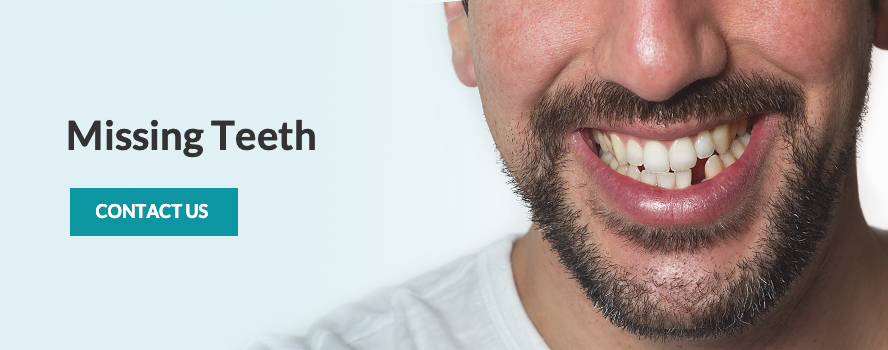Missing Teeth
Are you missing one or two teeth? You’re not alone. Around the world, it’s common for an individual to be missing one tooth or even two teeth. The most common missing teeth are upper lateral incisors, wisdom teeth and second premolars or bicuspids.
If you are missing more than two teeth, we recommend setting up an appointment with your local dentist to discuss the best options for you.
Common Causes of Missing Teeth
Tooth decay, periodontal disease, dental extractions, dental injuries, trauma, wear and tear and even genetics are often causes of missing teeth. Whenever possible, you should seek treatment to prevent these problems or avoid them entirely. While you can’t do anything about genetics, you can practice better dental hygiene that may save your teeth.
For some people, genetic disorders prevent permanent teeth from ever coming in. Hypodontia is a condition that describes the inability of six or fewer permanent teeth to develop. Some people are born without certain teeth as well — a condition known as congenitally missing teeth.
Ectodermal dysplasia is an inherited disorder that causes individuals to have abnormalities of two or more ectodermal structures such as teeth, hair, nails, salivary glands, sweat glands, cranial-facial structure or other parts of the body. The condition often presents when patients are young, so you can receive treatment before it leads to tooth loss.
How to Protect Your Teeth and Avoid Tooth Loss
You can’t prevent genetic conditions, but you can address the other causes of missing teeth before they get too serious. Here are some steps you can take to protect your teeth:
- Improve your dental hygiene. The answer to many dental problems is to adopt better flossing and brushing habits. That’s also true for preventing tooth decay and gum disease that can lead to tooth loss. Brushing at least twice a day and flossing once a day can remove much of the bacteria that cause infection and decay. You can also add mouthwash to your routine as an additional way to combat tooth loss.
- Get regular dental checkups. When you come for your biannual exams, we can find, track and prevent problems with the right care. For instance, we may see an inflammation we can treat with antibiotics before it becomes a full-blown infection. We also become familiar with your teeth so we can notice anything out of the ordinary right away. Finally, we identify if your oral hygiene habits need improvement, which can help you preserve your teeth for the long term.
- Get dental treatment for genetic conditions. Dental care won’t always save your tooth but may help minimize the number you lose if you seek treatment for your condition early. We know what to watch for concerning a progressing condition and can try solutions that have worked in the past for other patients.
- Act quickly in cases of trauma. Sometimes when a tooth gets knocked out, we can save it. The possibility depends on quick action and getting you into the office as soon as possible. When a dental emergency happens, contact us to improve the chances we can replace your missing tooth at our Grande Prairie office. Be ready to come with the tooth right away.
We understand that having missing teeth can be uncomfortable. You may feel self-conscious or be reluctant to smile. Let us help you get treatment for your missing teeth to boost your confidence levels and help you feel better about your smile. We have many teeth replacement options at our Grande Prairie office that may fit your needs.
Treatment Options for Missing Teeth in Grande Prairie
Missing teeth do not have to be permanent. Treatment options for missing teeth vary depending on age and dentition. At Gateway Dentistry Group, we offer several treatment options for missing teeth.
1. Fixed Dental Bridges
A dental bridge joins artificial teeth to adjacent teeth or dental implants. Dental bridges close the gaps in your smile caused by missing teeth. False teeth, or pontics, are typically made from porcelain to blend in with your other teeth. There are four types of dental bridges — traditional, cantilever, Maryland and implant-supported. Dental bridges are a versatile solution for replacing one or more teeth.
2. Dental Implants
Dental implants are replacement tooth roots about the size of a screw and made of titanium. They provide a strong foundation for fixed or removable replacement teeth that are made to match your natural teeth. Your dentist will conduct surgery to place the implants in your jawbone. Once they bond with your natural bone, implants will safely and securely support your replacement teeth or crowns.
We suggest checking with your insurance company to see if they cover bridges, implants or both. Sometimes, companies will cover bridges but not implants. Depending on the prosthesis your dentist recommends, the number of implants you will need during your dental implant surgery will vary. At Gateway Dentistry Group, the most common prosthesis options are a removable prosthesis, complete prosthesis, partial prosthesis (fixed bridge) or single prosthesis (crown).
3. Crowns
Crowns restore your teeth to their natural appearance. A crown is a cap that covers your tooth and helps strengthen and restore its shape and function. Dental crowns can also improve your chewing abilities and the appearance of your teeth. Crowns can be made from porcelain, gold or porcelain fused to gold. While porcelain crowns are natural-looking, gold crowns can last longer with the right care. We recommend asking your dentist which crown is best for you.
In Grande Prairie, you’ll need only one appointment to prepare your teeth before getting a crown. Your dentist will make precise models of the affected teeth using our high-tech iTero scanner, which captures thousands of pictures of your mouth to create a 3D model. This means you also get to avoid goopy impressions! The dentist will then shape a temporary crown for you to use in the interim. During your second appointment, your dentist will remove your temporary crown to make adjustments if needed and cement your crown to your teeth for a more natural look.
Gateway Dentistry Group offers all these teeth replacement treatments in Grande Prairie. We can discuss your options to discover which best fits your needs and budget. Any one of these solutions may work, depending on your unique situation. We want to ensure you feel comfortable with your choice and will answer any questions you have about the procedure before it takes place.
Why Replace Your Missing Teeth?
It is crucial to replace a missing tooth as soon as possible so that other, more severe conditions don’t develop. Replacing missing teeth can ensure jaw support, proper chewing, the stability of the remaining teeth and confidence. Missing teeth can disrupt the proper function of surrounding teeth — teeth next to and above the missing teeth can shift, move and tip into the empty space over time. To prevent significant shifting of the surrounding teeth, we suggest replacing a missing tooth or missing teeth right away.
Replacing a missing tooth can be a surefire way to restore confidence and self-esteem. Missing teeth can reduce the density of your jaw bone because it is no longer stimulated when chewing. This can lead to a diminishing jawline as well as stiffness in the muscle and joints. A dental restoration or dental filling can prevent further oral health complications in the future as well as restore the function and integrity of the missing tooth.
Schedule an Appointment With Gateway Dentistry Group Today
At Gateway Dentistry Group, our dentists provide quality orthodontic treatment in the Grande Prairie area. Whether you have missing teeth, a cavity or a dental emergency, we can help. For more information regarding causes or treatment for missing teeth or tooth loss, call us at 1-780-539-3555 or complete our online form today!




